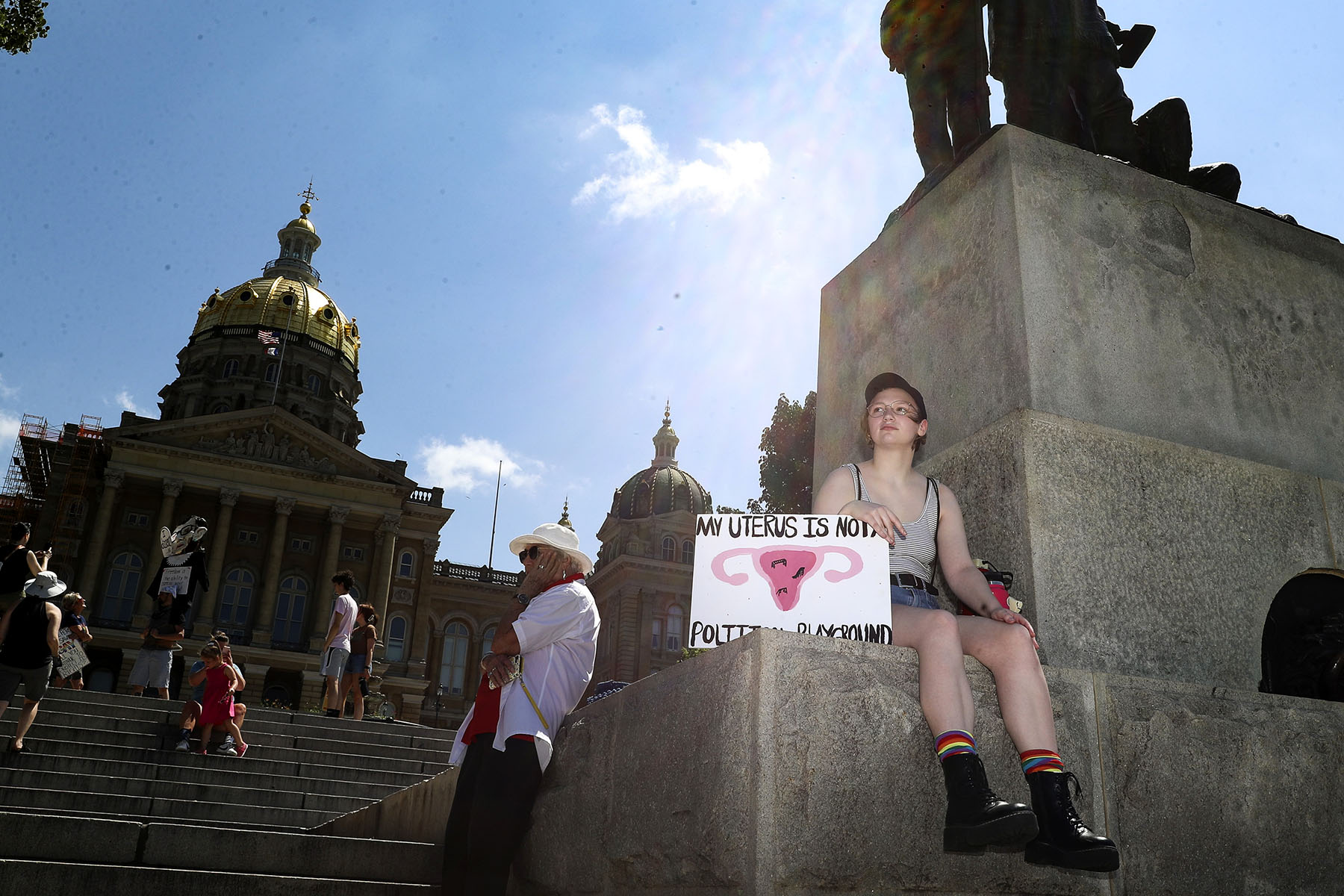Your trusted source for contextualizing the news. Sign up for our daily newsletter.
Iowa legislators passed a law banning abortion beyond six weeks of pregnancy during a special one-day legislative session convened specifically to pass the bill. The bill would end access to the procedure before many people know they are pregnant, which could effectively leave large swathes of the Midwest without abortion access.
Lawmakers deviated from the typical legislative process — which normally allows more public comment — to rush the proposed abortion ban through. It now heads to Gov. Kim Reynolds, who is expected to sign it Friday. It will take effect immediately.
The six-week ban includes exceptions if the pregnancy is the result of rape or incest, but requires those cases be reported to a “law enforcement agency or to a public or private health agency” within 45 or 145 days, respectively. But that may not work in practice, since most cases of rape or incest are not reported at all. The ban allows narrow exceptions for “medical emergencies” or if a doctor judges that the fetus is “incompatible with life.”
According to federal data from 2020, the most recent year for which data is available, most abortions in Iowa took place after six weeks of pregnancy.
Planned Parenthood, which operates five abortion providers in Iowa, has filed a lawsuit over the ban in state court. The legislature passed a similar ban in 2018, four years before the Supreme Court ruled to overturn Roe v. Wade. But a district court blocked it before it went into effect, arguing it violated the state’s constitution.
-
Explore Our Dashboard:
-
Explore Our Dashboard: What abortion looks like in every state — right now
Reynolds asked the same district court that had blocked the 2018 ban to reconsider it after Roe was overturned. The court held that even without federal protections, Iowa’s founding documents guarantee the right to an abortion. The state government appealed to the Iowa Supreme Court, and on June 16, that body deadlocked 3-3 over whether to allow the 2018 ban to take effect, ultimately letting the district court’s decision to block the six-week ban stand.
Committee hearings on the six-week abortion ban began at 9:30 a.m. CT, and the heated legislative debate, which began in both chambers around 5 p.m. CT, went until near 11:30 p.m in the Senate. Protesters filled the halls of state capitol building, their chants — including a repeated “Vote them out” — audible from inside the committee hearing where lawmakers heard testimony earlier in the day about the ban’s potential effects.
A six-week abortion ban appears unpopular among Iowans. Per a poll conducted in March, 61 percent of Iowans — 70 percent among women — believe abortion should be legal in most or all circumstances.
From the Senate floor, Republican lawmakers argued that the six-week ban gave people sufficient time to determine if they are pregnant and to seek an abortion. But because the first sign of pregnancy is often a missed menstrual period, the absolute earliest someone will know they are pregnant is when they are already four weeks along.
Anti-abortion activists in the state are pushing a statewide ballot referendum to amend the Iowa constitution so that it explicitly does not protect abortion rights. If the measure is approved by the legislature in next year’s session, Iowans would get a chance to vote on the initiative in November 2024, and its passage could increase the odds that the state’s six-week ban takes effect. Since Roe’s overturn, every ballot initiative to eliminate state abortion rights across the country has failed to pass.
If the Iowa ban does take effect, it would further erode legal abortion in a region where access has been decimated. State residents would likely have to travel to Minnesota, Illinois or Kansas to seek an abortion. Nebraska just passed a law this spring banning abortion at 12 weeks. And in Indiana, a near-total ban on the procedure is set to take place August 1.
Clinics in nearby states will be a resource for some Iowans, said Mazie Stilwell, a spokesperson for Planned Parenthood North Central States. But travel will be unaffordable for many people who otherwise might have sought an abortion, she said. In the past year, clinics in Kansas and Illinois have already seen some of the nation’s largest increases in out-of-state patients — meaning it’s unclear if they will have the capacity to absorb Iowans as well.
“That is something that is a very real concern,” she said.
Rebekah Barber contributed additional reporting.







